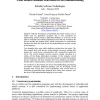Free Online Productivity Tools
i2Speak
i2Symbol
i2OCR
iTex2Img
iWeb2Print
iWeb2Shot
i2Type
iPdf2Split
iPdf2Merge
i2Bopomofo
i2Arabic
i2Style
i2Image
i2PDF
iLatex2Rtf
Sci2ools
102
click to vote
ADAEUROPE
2009
Springer
2009
Springer
Weak Fairness Semantic Drawbacks in Java Multithreading
With the development of embedded and mobile systems, Java is widely used for application programs and is also considered for implementing systems kernel or application platforms. It is the aim of this paper to exemplify some subtle programming errors that may result from the process queuing and awaking policy, which corresponds to a weak fairness semantic and which has been chosen for implementing the monitor concept in this language. Two examples show some subtle deadlocks resulting from this policy. The first example deals with process synchronization: processes seeking after partners for a peer-to-peer communication call a symmetrical rendezvous server. The second example concerns resource sharing according to a solution of the dining philosophers paradigm. In this example, several implementations are presented, the last ones aiming to provide deterministic process awakening. All these examples have been validated and simulated and this allows comparing their concurrency complexity ...
ADAEUROPE 2009 | Dining Philosophers Paradigm | Software Engineering | Subtle Programming Errors | Symmetrical Rendezvous Server |
| Added | 25 May 2010 |
| Updated | 25 May 2010 |
| Type | Conference |
| Year | 2009 |
| Where | ADAEUROPE |
| Authors | Claude Kaiser, Jean-François Pradat-Peyre |
Comments (0)

